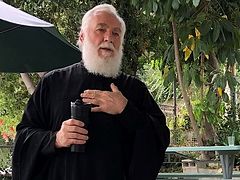God is our true Life, and man is the image of God. And that is why in Holy Scripture we see two main commandments: love of God and love of neighbor. If you do not love God you will never come to Him; but it is impossible to attain love for God if you disdain your neighbor. Love of neighbor is a clear test of our Christian life. But in order to understand what the love of our neighbor is, it would be good to first clarify who in fact is our neighbor?
It would seem to be quite understandable—our neighbors are those who are close to us, our family, friends, acquaintances, co-workers… And of course that’s true. After all, it would be strange to talk about love for people in general without being able to stand those who immediately surround us. How often we get irritated with people close to us, who we see every day, and take our love somewhere to the periphery, to people we practically do not know. Such love is deceptive, while real love can be seen in relation to real people, whom God has brought into your life.
However in the Holy Scriptures the question of our neighbor is much more complicated and turns our gaze to deeper spheres.
In the Gospel there is a well-known parable about the Good Samaritan (cf. Lk. 10:37). This parable was preceded by the question of a certain scribe—what to do in order to inherit eternal life. The Lord turns his attention to Holy Scripture, and the scribe himself recalls the commandment to love God with all your soul, and your neighbor as yourself (Deut. 6:5; Lev. 19:18). The Savior confirms the truth of the ancient commandment, and here comes the scribe’s main question—who are we supposed to consider our neighbor so that we can love him like our own selves?
There was no deceit or sarcasm in this question, as it might seem at first. The thing is that in those days the Jews divided all of mankind into three categories. The Jews, that is, people related by blood and faith, were considered not just neighbors but brothers. People of other tribes who received Judaism were only called neighbors. But the pagans were considered absolutely alien, and the commandment of love did not extend to them. It would seem that the error of this understanding is obvious. But if we pay attention to our own real life, then we will discover that we ourselves at times unconsciously do the same, by dividing all the people around us into these same three categories. To be exact: There are people we adore, considering them the closest, and are ready to help them without a second thought at any time of the day or night. To others we are not as warmly and openly inclined, but in general we are well disposed and will meet them half way in specific situations. The third group we can’t stand (perhaps due to some offense they caused us), and there can be no talk of our helping them.
St. Maximos the Confessor talked about such an approach to people: “If you hate some people, are indifferent to others, while yet others you love very much, then you can conclude from this how far you are from perfect love, which motivates us to love every person equally.” Therefore the parable about the merciful Samaritan is quite relevant to our times as well.
Let’s recall what it says. A certain man was walking from Jerusalem to Jericho and was attacked by thieves, who robbed him, and after inflicting many wounds on him, left him on the road. The Jewish priest and the Levite passed the poor man by without paying him any attention. But the Samaritan, that is, a man whom the Jews despised, who happening to be passing by, not only gave the man first aid—binding his wounds and pouring oil and wine on them (softening and disinfecting the wounds according to the medical practice of the day)—but also took care for the victim’s further existence. He brought him to the inn and gave the innkeeper money to take care of the wounded man, promising to recompense him for anything spent beyond that on his return trip.
Which of these three was the neighbor to the sufferer is obvious. The Lord wanted to show that true closeness is not determined by relational categories, cohabitation, or even by faith, but first of all by selfless and sincere love for another human being, no matter who he is. In the scribe’s question, “Who is my neighbor?” there was a certain caution that he might start loving someone he’s not supposed to love. But the Lord Jesus Christ showed him that true love knows no humanly invented limits on the care for the well being of a needy person. Then said Jesus unto him, Go, and do thou likewise (Lk. 10:37); that is, consider as your neighbor every person who needs your help—even if he is of a different faith and antagonistic toward you, do good to him, and in this way you will acquire that eternal life you asked about.
Regarding the parable, there is something more we’d like to say. Let’s think about it—why did the Samaritan show such compassion? Because he saw his neighbor in the suffering man, without even thinking about how this Jew sees him. And this is a very profound truth. In fact, our neighbor is not the one from whom we expect help, not a person from whom we expect gratitude. Thus the golden rule that every Christian should follow: Don’t expect that someone else will do good, but hasten to do good yourself. This is how we fulfill God’s commandment of love for our neighbor (Lev. 19:18).
Apostle Paul wrote: Let this mind be in you, which was also in Christ Jesus [in Slavonic, “You should have the same feelings as did Christ Jesus.—Trans.] (Phillip. 2:5). How did the Savior received those around Him, how did He treat the needy, how did He relate to His enemies, who crucified Him? The apostle Paul wrote about this: Fulfil ye my joy, that ye be likeminded, having the same love, being of one accord, of one mind. Let nothing be done through strife or vainglory; but in lowliness of mind let each esteem other better than themselves. Look not every man on his own things, but every man also on the things of others (Phillip. 2:2–4).
It often happens in our own lives that it is easiest to love those who are far from us, whom we only meet from time to time. This is understandable—everyone tries to look his best before others, not showing his negative qualities. And we succeed in this if we meet them rarely. But in closer relationships our more unpleasant sides are revealed. Therefore it’s harder to love our close ones than those farther away. But although love for those distant seems easy, it cannot be deep; it has not been tested by serious contact or by resolving some problems with them.
Does this mean that real love is proved by everyday life? Yes, it is expressed in the little things that we don’t want to pay any attention to. It is especially shown in the kindness and mercy that we should show our neighbors precisely every day.
In conclusion I would like to quote the words of St. Theophan the Recluse: “The deepest and primary commandment: to love. It is a little word, but it expresses an all-encompassing work. It is easy to say, love, but not so easy to attain to the necessary measure of love. It is not entirely clear either how to attain it. Therefore the Savior furnishes this commandment with other explanatory guidelines: Love, like your own self (cf. Matt. 22:39); do unto others as you would have them do unto you (cf. Lk. 6:31). Here is shown, we can say, a measure of love that is measureless; for is there a measure of love for your own self and is there some good that you would not wish for yourself from others? Meanwhile, however, this prescription is not impossible to fulfill. It is all a matter of entering into perfect sympathy with others so that you transfer their feelings to yourself, to feel as they feel. When this happens, there is no need to point out what you should do for others in this case—your heart shows you what to do. You must only take care to support this sympathy; otherwise egoism will come and immediately turn you back on yourself and lock you in. Then you won’t lift a finger for someone else, even if he’s about to die. When the Lord said, ‘Love your neighbor as yourself’, He wanted that our neighbor would be in us instead of ourselves, like our own selves. But if as before, our own “I” will still be standing there, then nothing good will come of it.”





